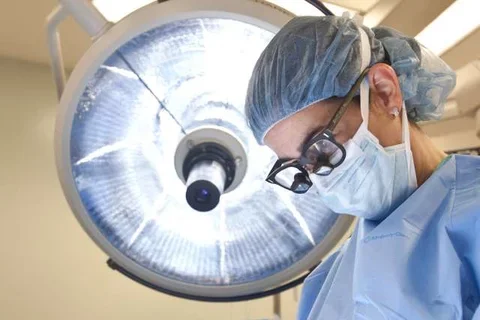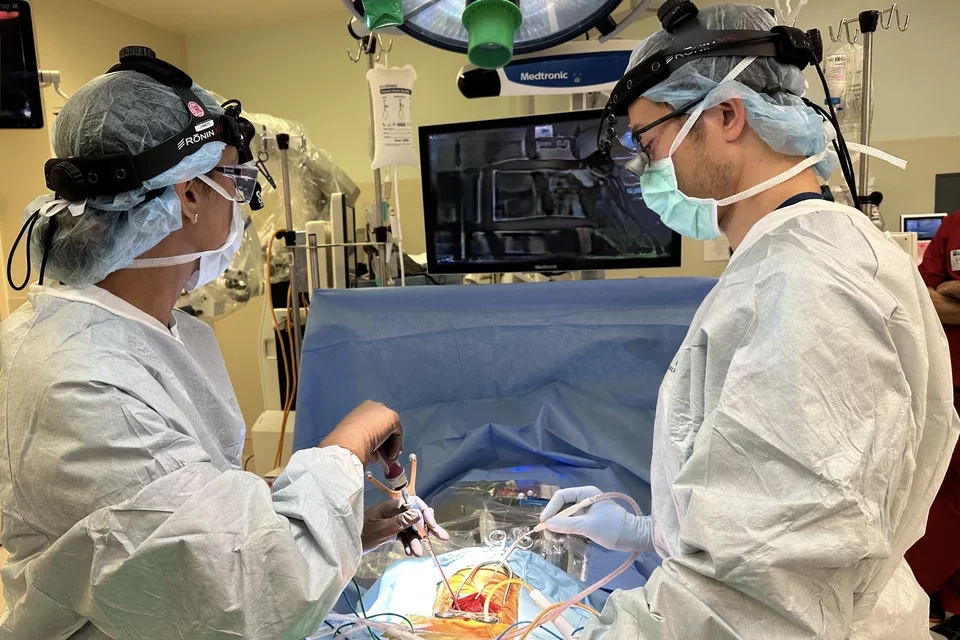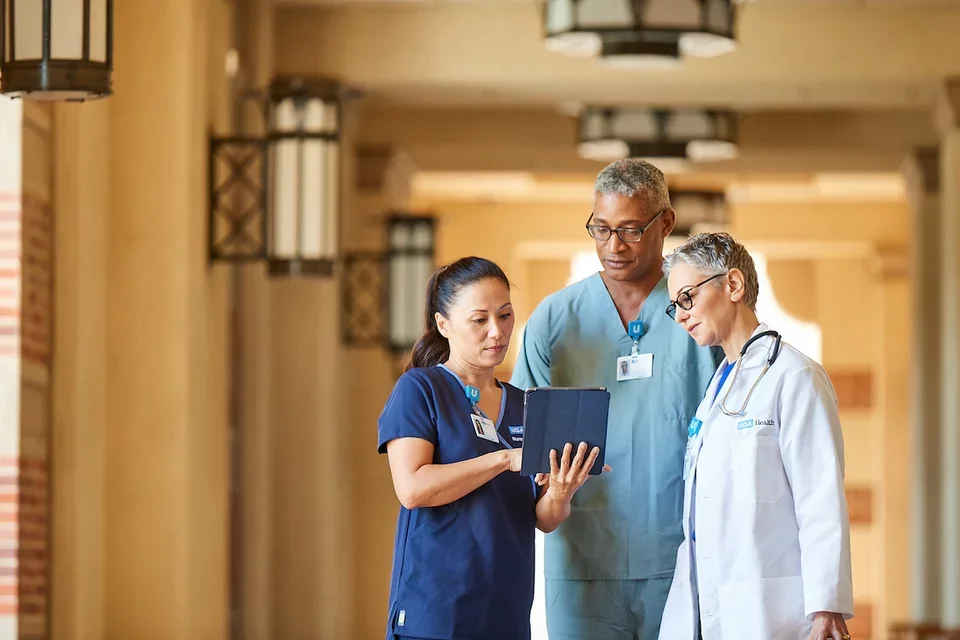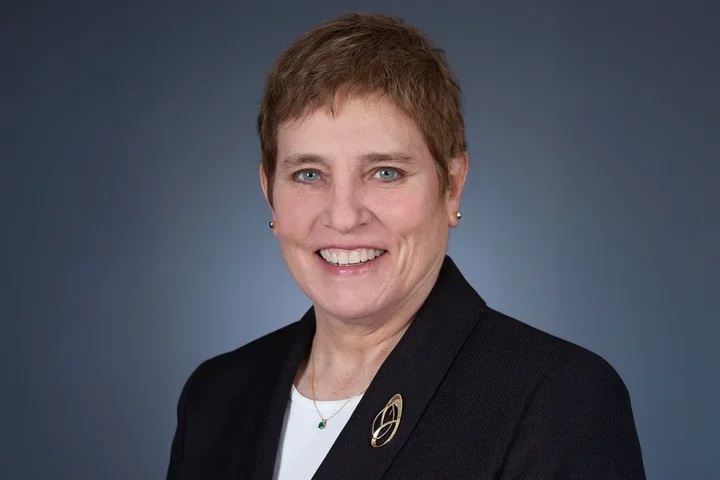What Is an Orthopedic Doctor?
Faculty Spotlight

A Day in the Life of Dr. Elizabeth Lord, Orthopedic Surgeon at UCLA Health
Orthopedic surgeons (also called orthopedic doctors or orthopedists) care for patients experiencing musculoskeletal pain and impairment.
“Orthopedic surgeons really do fix things, and by ‘things’ I mean human bodies,” says orthopedic surgeon Elizabeth L. Lord, MD, who specializes in spine surgery.
“Much of medicine and even some surgery involves managing chronic diseases rather than curing them, but in orthopedic surgery, we typically take a problem and cure it with our hands.”
An orthopedic surgeon’s work makes a big difference in patients’ lives.
“We help them walk longer or be able to pick up their grandkids or play sports,” she says. “It’s very rewarding—to be able to get people back to their lives.”

During a typical week, Dr. Lord spends time seeing patients in the clinic. If they’re new patients, she’ll ask them about their pain and symptoms, review results from any previous imaging scans or other medical tests, and discuss additional diagnostics and care recommendations, which often involve physical therapy, injections, and/or surgery.
She also spends a lot of time in the operating room.
“The procedures we do are highly variable,” she says. “We might do one surgery for a complicated scoliosis case that takes all day or multiple smaller procedures such as microdiscectomies or cervical arthroplasties all in one day.”
In addition to her core responsibilities of seeing patients and doing surgeries, Dr. Lord “takes call.” This is when an orthopedic surgeon makes themselves available to answer emergency calls.
“The emergencies include things like hip fractures, spine fractures, and joint infections,” she explains. “We have to come in sometimes in the middle of the night and drop whatever we're doing to take care of those surgeries right away.”
This part of the job, she says, is important for aspiring orthopedic surgeons to be aware of.
“It’s not always obvious that taking emergency calls can be a big part of life for orthopedic surgeons. But this is a time when we can make a big difference in patients’ lives.”
Orthopedist Definition
Orthopedic surgeons are physicians specially trained to take care of all aspects of the musculoskeletal system, specifically through surgical interventions.
What Does an Orthopedic Doctor Do?
Orthopedic doctors help optimize quality of life for their patients—patients affected by pain and conditions linked to the musculoskeletal system, which includes muscles, bones, ligaments, tendons, and cartilage.
These physicians see patients in the clinic and may perform some non-surgical interventions but generally focus on performing operations, including:
- Joint replacement
- Bone grafting
- Meniscus repair
- Hip replacement
- Disk replacement
- Shoulder arthroscopy
Many orthopedists complete specialized training to practice in a niche subspecialty.
Orthopedic Surgery Subspecialties
Orthopedic subspecialties include:
- Hand Surgery
- Orthopedic/Musculoskeletal Oncology
- Orthopedic Trauma
- Pediatric Orthopedic Surgery
- Orthopedic Sports Surgery
- Adult Reconstructive Orthopedic Surgery
- Foot and Ankle Orthopedic Surgery
- Orthopedic Spinal Surgery
- Shoulder and Elbow Surgery
Physiatrist vs Orthopedist - What’s the Difference?
Physiatrists and orthopedists are both physicians who help patients manage pain and regain physical mobility and functionality.
Physiatrists and orthopedists complete different residency training following medical school:
- Physiatrists complete residency training in physical medicine and rehabilitation (PM&R).
- Orthopedists complete residency training in orthopedics and orthopedic surgery.
Generally speaking, they’re differentiated by the types of interventions they offer:
- Physiatrists focus primarily on non-surgical interventions
- Orthopedists focus primarily on surgical interventions
However, some orthopedists also do non-surgical interventions and some physiatrists do non-surgical procedures. Patients choosing which type of physician to see should carefully review what services each individual physician offers and what specialty areas they practice in.

What Kind of Patients See an Orthopedic Doctor
An orthopedic doctor will see patients when they’re experiencing acute or chronic musculoskeletal pain. This includes pain radiating and/or originating from the neck, upper back, lower back, shoulders, elbows, arms, hands, wrists, knees, feet, and ankles.
“We address musculoskeletal pain occurring anywhere except the chest or the head,” says Dr. Lord.
The field of orthopedic care is highly specialized. Many patients find their way to orthopedic doctors via referrals from primary care physicians. These general practitioners hear complaints, take x-rays, and prescribe anti-inflammatory medicines. They refer cases that require more specialized care to orthopedic doctors.
What Conditions Does an Orthopedic Surgeon Treat?
Orthopedic doctors treat an extensive range of conditions, including but not limited to:
- Arthritis
- Fractures
- Degenerative conditions, such as rotator cuff or meniscus tears
- Herniated discs
- Anterior cruciate ligament (ACL) tears
- Carpal tunnel
- Cervical stenosis
- Scoliosis
- Musculoskeletal injuries
- Bone tumors
“We treat all conditions that have anything to do with the bones, joints, and muscles,” Dr. Lord explains. “We also treat tumors that come up in any of the bones or the muscles.”
How to Become an Orthopedic Surgeon
Aspiring orthopedists should expect to complete medical school and a five-year residency in orthopedics and orthopedic surgery. They may also complete additional fellowship training in an orthopedic subspecialty.
Dr. Lord says it’s important for trainees to understand that specialization means focusing in that subspecialty. For example, hand surgeons generally perform hand surgeries only. Orthopedic doctors don’t typically switch between their subspecialty functions and more general orthopedic surgery functions.
“One caveat is that many orthopedists, regardless of their subspecialty, will take emergency call in general orthopedics, mostly taking care of fractures, acute infections, and things like that,” Dr. Lord explains, adding that it’s very uncommon to practice general orthopedics in major cities.

Dr. Lord’s path to becoming an orthopedic surgeon had a few twists and turns. She completed college and started a desk job before realizing she wanted to become a doctor. The desk job happened to be with a healthcare consulting firm. She worked closely with physicians daily.
“I made the decision to go to med school and become a surgeon so I could have a more active professional life,” she says. “I wanted to do something more physical than sitting at a desk all day.”
She found surgery overall and orthopedic surgery specifically appealing because it focused on definitive treatments. The inverse is what she finds most challenging about her work today: It’s difficult when there is no definitive treatment—when she’s not certain how to help a patient.
“Back pain is a good example because we don’t always understand it or where it comes from,” she explains.
“There are many cases in which I want to help people, but I don't know of any surgery that can help them. It can be very difficult for patients to understand and accept and very frustrating for a physician.”
Dr. Lord advises medical students interested in orthopedics to be sure they want to spend a lot of time performing operations. While orthopedic surgeons may choose to practice different types of surgeries—everything from inpatient surgeries to correct spinal abnormalities to outpatient hand surgeries—they all spend a lot of time in the operating room.
“You have to be willing to work hard even when you don't feel like it,” she says. “Patient needs come up at all times, on nights and weekends. In some fields, you can turn off your phone when you leave work. This is not one of those fields.”
Med students should be willing to incorporate that reality into their lifestyle. Beyond that, strong orthopedic surgery candidates are typically meticulous.
“This field requires exactness and pristine attention to detail.”
Aspiring orthopedic surgeons should also be prepared to work on care teams.
“Orthopedic surgery is a team sport. Nobody can do surgery alone. It always requires a team,” Dr. Lord explains, adding that post-operative care also involves teamwork and collaborating with professionals across multiple disciplines, including physiatrists and physical therapists.
Beyond those core skills, empathy and the ability to listen and relate to patients will optimize an orthopedist’s ability to help and heal their patients.
“We perform many of our surgeries with the goal of restoring function and getting people back to the things they want to do in life,” says Dr. Lord. “So it's important for the physicians to understand what the patient's goals are and tailor the surgery in a way that aims to meet those specific goals.”
How Long Does It Take to Become an Orthopedic Surgeon?
It takes at least 13 years to become an orthopedic surgeon. This time includes:
- Earning an undergraduate degree at a college or university (4 years)
- Earning a medical degree by completing medical school (4 years)
- Completing residency training in orthopedics and orthopedic surgery (5 years)
Beyond this core training path, additional years may be required to complete fellowship training or to study for and pass board certification examinations.
Orthopedic Surgeon Salary - How Much Do Orthopedic Surgeons Make?
According to recent Medscape compensation data, orthopedists practicing in the United States make an average of $557,000 annually.
Scoliosis Awareness Month
Scoliosis Awareness Month takes place every June. The observance spreads awareness of scoliosis, an abnormal curvature of the spine that may cause pain or impair mobility. The month encourages individuals to seek treatment by highlighting different options.
“Scoliosis is a condition that can be painful but also very scary, isolating, and emotionally challenging for people, whether they’re planning to manage it via surgery or non-operative means, such as bracing or physical therapy,” says Dr. Lord.
She advises patients with scoliosis to focus on the body they have and living in that body in the best way they can. They might minimize pain and maximize function by strengthening their core and keeping their hamstrings flexible, for example.
“That's something anybody can work on every day—stretching their hamstrings and doing some planks, sit-ups, or deadbugs.”
On top of pain and discomfort, scoliosis can have a severe negative impact on an individual's body image. Dr. Lord wants everyone to know that people with scoliosis, whether they undergo surgery or not, can live completely normal, healthy, and active lives.
“No one should feel any stigma about having scoliosis,” she says.



